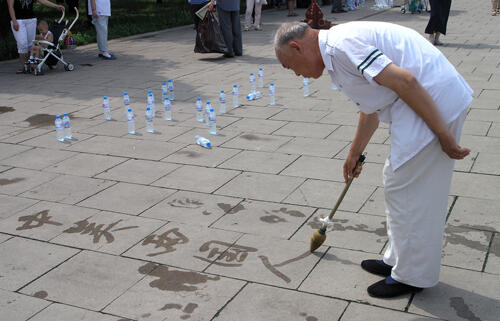What does
International conference launches new USC institute focusing
on
April 19, 2007,
View a video and summary of the event.
What: 1. “The Future of U.S. – China Relations” conference features 25
distinguished scholars examining the multidimensional and
evolving
Topics: State to State Relations in a Changing Economic Environment
Prospects for Political Reform
Social and Economic Disparity
Energy and Environmental Concerns
Cultural and Intellectual Trends
2. Herbert G. Klein Lecture by Ambassador J. Stapleton Roy
When: Conference
Friday, April 20, 2007: 9:30 am – 5 pm
Saturday, April 21, 2007: 9 am – 2:30 pm
Klein Lecture
Friday, April 21, 2007: 6 – 7:30 pm
Where:
USC University Park Campus
Enter gate 3, Figueroa, south of Jefferson
Directions available at:
http://www.usc.edu/about/visit/upc/driving_directions
Who: USC
Website: china.usc.edu
Phone: 213-821-4382 / Fax: 213-821-2382
Complete speaker list below.
The
The outlines of
This economic success has helped
Enormous internal migration has enabled the staffing of factories and mines. Perhaps 200 million Chinese have left their village homes for the cities, the largest movement of people in world history. This has divided families and generated child care, education, health care, occupational safety, and many other challenges.
Tremendous problems confront the Chinese. Corruption, underemployment, escalating energy needs, and environmental degradation are among these. To highlight two of these,
Along with these massive economic and demographic changes, the expansion of telecommunications (more than 300 million Chinese have cell phones and at least 150 million Chinese are logging in to the internet) and greater openness has permitted people in
In an effort to increase its flexibility, the Communist Party-led state has experimented with reforms, including village-level elections. The leadership is sensitive to the widening social and economic disparities and has launched campaigns to “put people first,” to develop the relatively poor Western regions of
To explore these changes and to debate what they mean for the
Contacts: Clayton Dube, mailto:cdube@usc.edu / 213-821-3936
Linda Truong, mailto:lntruong@usc.edu / 213-821-4382
List of presentations and speaker biographies available at the USCI website:
Speakers:
Ambassador J. Stapleton Roy – Keynote Address (Friday, 6 – 7:30 pm)
Geremie Barmé (
Carolyn Cartier (
Warren Cohen (
David Dollar (World Bank) – paper presented, not able to attend
June Teufel Dreyer (
Elizabeth Economy (Council on Foreign Relations)
Richard Louis Edmonds (
C. Cindy Fan (UCLA)
Edward Friedman (
Merle Goldman (
Guo Liang (
C. Anderson Johnson (USC)
Harry Harding (Eurasia Group)
Eric Heikkila (USC)
Daniel Lynch (USC)
Andrew Nathan (
Kevin O’Brien (UC Berkeley)
William Overholt (
Orville Schell (UC Berkeley)
Wang Shaoguang (
Zhao Suisheng (
David Zweig (

